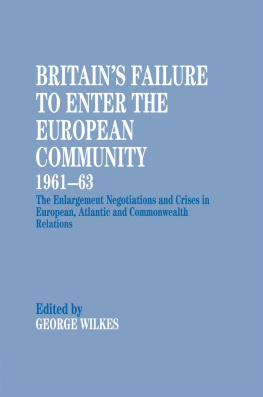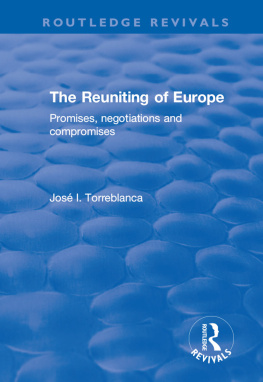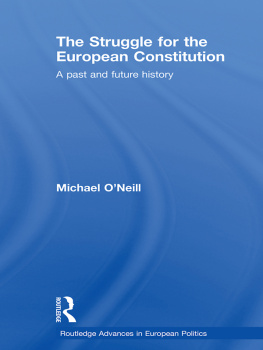
BRITAIN'S ENTRY INTO THE EUROPEAN COMMUNITY
Foreign and Commonwealth Office (FCO) Publications
Series Editors: Gill Bennett and Keith Hamilton
ISSN: 1471-2083
FCO historians are responsible for editing Documents on British Policy Overseas (DBPO) and for overseeing the publication of FCO Internal Histories.
DBPO comprises three series of diplomatic documents, focusing on major themes in foreign policy since 1945, and drawn principally from the records of the Foreign and Commonwealth Office. The latest volumes, published in Series III, are composed almost wholly of documents from within the thirty-year 'closed period', which would otherwise be unavailable to the public.
Since the early 1960s several Internal Histories have been prepared by former or serving officers, the majority of which concentrated upon international developments and negotiations in which the UK has been directly involved. These were initially intended for use within the FCO, but some of the more substantial among them, studies that offer fresh insights into British diplomacy, are now being declassified for publication.
Forthcoming FCO publications:
Detente in Europe, 19721976
Documents on British Policy Overseas, Series III, Volume III
Gill Bennett and Keith Hamilton (eds)
The Southern Flank in Crisis, 197377
Documents on British Policy Overseas, Series III, Volume IV
Gill Bennett and Keith Hamilton (eds)
Britains Entry into the European Community
Report by Sir Con ONeill on the Negotiations of 19701972
Edited and with a Foreword by
Sir David Hannay, GCMG
First published in 2000 by Frank Cass Publishers
Published 2017 by Routledge
2 Park Square, Milton Park, Abingdon, Oxon OX14 4RN
711 Third Avenue, New York, NY 10017, USA
Routledge is an imprint of the Taylor & Francis Group, an informa business
Crown Copyright 2000
All rights reserved. No part of this book may be reprinted or reproduced or utilised in any form or by any electronic, mechanical, or other means, now known or hereafter invented, including photocopying and recording, or in any information storage or retrieval system, without permission in writing from the publishers.
Notice:
Product or corporate names may be trademarks or registered trademarks, and are used only for identification and explanation without intent to infringe.
British Library Cataloguing in Publication Data
ONeill, Sir Con, 19121988
Britain joins the European Community: report by Sir Con ONeill on the
negotiations of 19701972. (Foreign and Commonwealth office
publications)
1. European Union 2. Great Britain Foreign relations
European Union countries 3. European Union countries
Foreign relations Great Britain
I. Title II. Hannay, David
327.4'1'04
ISBN 13: 978-0-7146-5117-0 (hbk)
ISSN 1471-2083
Library of Congress Cataloging-in-Publication-Data
ONeill, Con, Sir, 19121988.
Britain joins the European Community: report by Sir Con ONeill on the negotiations of
19701972 / Sir Con ONeill; edited with a
foreword by Sir David Hannay.
p. cm.
Includes index.
ISBN 0-7146-5117-6 (cloth)
1. European UnionGreat BritainHistorySources. 2. International and municipal
lawGreat BritainHistorySources. I. Hannay, David, Sir. II. Title.
KD4015.O545 2000
341.242'2'0941dc21
00-043124
Published on behalf of the Whitehall History Publishing Consortium. Applications to reproduce Crown copyright protected material in this publication should be submitted in writing to: HMSO, Copyright Unit, St Clements House, 216 Colegate, Norwich NR3 1BQ. Fax: 01603 723000. E-mail: copyright@hmso.gov.uk
Typeset by Vitaset, Paddock Wood, Kent
Contents
by Sir Con O'Neill
When I first read this report, shortly after it was written in 1972, I can recall feeling regret that, for some thirty years or so, it was fated to be read by relatively few people and that, as Sir Con O'Neill himself observed, 'the only people able to read it will lack the time to do so'. The reasons for confidentiality were understandable. The subject matter was controversial in domestic political terms, some of the judgements were more so; and the comments on and assessments of the governments of our European Community partners were sufficiently perceptive and acerbic to risk complaint. My other immediate reaction, as one who had been directly involved throughout the negotiations in a junior capacity, was sheer admiration at the way in which the trees were marshalled into recognisable and well-explained woods; and at the broad sweep of the analysis of negotiations whose course and outcome at the time, only a few months before the report was written, had been far from clear even to those who were closely involved. This might not, properly speaking, be history, as its author modestly asserts, but it was evidently a remarkably valuable source for the subsequent writing of history.
It is usually unwise to claim that something is unique, but it is safe to assert that this report is highly unusual. Firstly it is, with a few minor exceptions, entirely written by one person, whereas the frequent but not invariable practice with such internal records, as was indeed the case with the report that was written on the earlier, unsuccessful negotiations for accession to the Community in 1961-63, is to follow a more collective pattern. In addition, this report is one man's personal work, the assessments and judgements contained in it having been submitted to no screening process. Moreover the author reporting directly to Ministers and having advised them throughout the negotiations, was well placed to comment on the main policy issues as well as to be abreast of the technicalities and the detailed ins and outs of the actual negotiating process. The fact that the report was written for a small audience (it was in fact considered sufficiently sensitive to be sent only to named and numbered recipients) and was clearly destined to remain confidential for a substantial period of time, freed it of the need for excessive discretion and also of the almost obligatory Panglossian spin which is so often given to immediate reporting on a ministerial visit or negotiation destined to be circulated more widely. And being written so soon after the events that it described, the author has avoided even the slightest temptation to benefit from hindsight or to adjust the judgements to fit the development that followed the negotiations.
The report provides the anatomy of a negotiation, at times going into almost excruciating detail, at others standing back and giving a broad-brush overview of what was at stake. The view is, of course, a very British view, illuminated with much information and speculation about the positions and motivations of the other governments principally involved, but with such information derived almost exclusively from British sources or from those who knew that what they said would end up being analysed by their British negotiating partners. Within these limitations, the anatomy is defined with great clarity. The negotiating machinery is explained; the dealings with the Community, with the governments of the original Six member states, with the other applicants and with the EFTA non-candidate countries, with the Commonwealth countries most affected and with the Press are all fully spelled out. The process by which the British government itself defined its negotiating position, then deployed that position, and the results that were achieved, is there in detail. The insight thus given into how a negotiation such as this actually works, indeed in some cases what it feels like to be involved in it, goes far beyond that usually available.








